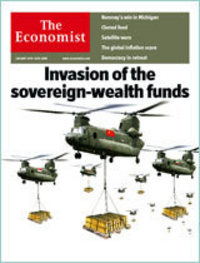・読者登録
・団体購読のご案内
・「編集委員会会員」を募集
橋本勝21世紀風刺絵日記
記事スタイル
・コラム
・みる・よむ・きく
・インタビュー
・解説
・こぼれ話
特集
・反戦・平和
・国際
・アジア
・市民活動
・政治
・みる・よむ・きく
・欧州
・中東
・入管
・人権/反差別/司法
・核・原子力
・環境
・文化
・イスラエル/パレスチナ
・難民
提携・契約メディア
・AIニュース


・司法
・マニラ新聞

・TUP速報



・じゃかるた新聞
・Agence Global
・Japan Focus

・Foreign Policy In Focus
・星日報
Time Line
・2026年01月17日
・2026年01月16日
・2026年01月12日
・2026年01月11日
・2026年01月03日
・2025年12月27日
・2025年12月23日
・2025年12月22日
・2025年12月19日
・2025年12月17日
|
|
2008年02月07日14時13分掲載
無料記事
印刷用
時事英語一口メモ
【41】「国境を越えた投資」か「国境を越えた国有化」か
<A href="http://jijieigo.at.webry.info/200804/article_8.html" target="_blank">ブログ版</A>
Sovereign wealth fund(ソブリン・ウェルス・ファンド)はいま最もホットな話題である。1月のダボス会議ではSWFが主要なテーマになった。焦点は、SWFが旧来の“cross-border investment”(国境を越えた投資)なのか、あるいはサマーズ元財務長官が言うところの(政府が他国の自由市場で干渉をする)“cross-border nationalization”(国境を越えた国有化)なのかである。(鳥居英晴)
SWFについての日本語訳がまだ定まっていない。日本のメディアは、便宜的に「政府系ファンド」という言い方をしている。大和総研の田代秀敏主任研究員はこれに異議を唱え、東京財団のレポート(1月29日)で「主権ファンド」という言葉が適切であるとしている。
「SWFを『政府系ファンド』あるいは『国富ファンド』と呼ぶのは適切でない。前者は性格がまったく異なる金融機関である日本の「政府系銀行」を連想させるからであり、後者は「国富」が経済用語として別の意味で用いられているからである。
SWFは、組織の形態や運営の方法はさまざまである。しかし、『ソヴリン』つまり主権の管理下にある外貨準備などの金融資産を、主権を握る政府または王族あるいは党の目的のために運用する点で共通する。そこで、ソヴリン・ウェルス・ファンドを『主権ファンド』と呼ぶことにする」
ちなみに、中国のSWFである中国投資有限責任公司(CIC)が昨年9月に設立された中国では、SWFは「主権財富基金」と訳されている。また、韓国投資公社(KIC)というSWFを持つ韓国では、국부펀드(国富ファンド)と言われている。政府および政府機関または世界銀行など国際機関が発行・保証した債券であるsovereign bondは、中国語では主権債と訳されているが、日本ではソブリン債と言われている。一方、Wikipediaでは「ソブリン・ウエルス・ファンド」という項目が立てられているが、「政府系ファンド」などへの改名が提案されている。統一した訳語は決まりそうにない。
SWFが存在感を高めたのは、サブプライムローン(信用力の低い個人向け住宅融資)の巨額損失に苦しむ欧米金融機関へ資本支援したためである。
昨年夏、欧米では膨張を続けるSWFへの警戒感が高まった。ドイツのメルケル首相はSWFに対して”naive”であってはならないと警告し、SWFの投資を規制する法的処置の検討を表明した。しかし、インターナショナル・ヘラルドトリビューン(1月16日)によると、サブプライム危機が始まると、SWFに対する欧州の態度は軟化したという。ドイツは最近、規制の規模を縮小することにした。
"Since the credit crunch began, you can sense a different mood," said Philip Whyte, a senior researcher at the Center for European Reform, a private research group based in London. "All of a sudden sovereign wealth funds have become the knights that ride to the rescue, and that has probably defused the potentially protectionist edge to the issue."
(「信用収縮が始まると、ムードは変わった」とロンドンの民間調査グループのCenter for European Reformの研究員であるPhilip Whyteは言う。「突然、SWFは救いに駆けつける騎士になり、恐らく、その問題への保護主義の強まりの可能性を防いだ」)
しかし、警戒感も依然残る。英紙フィナンシャル・タイムズ(1月21日)でJohn Willmanは“Yesterday’s bad guys ride to the rescue”(きのうの悪者が救済に駆けつける)と題した記事で次のように述べている。
Yesterday’s villains have become today’s white knights. Less than a year ago, the growing power of sovereign wealth funds was attracting criticism in the US and Europe as state-backed foreign investors used their enormous cash piles to snap up corporate assets.
(きのうの悪者がきょうは白馬の騎士になった。1年もしない前には、外国の国家投資家が企業の資産を買い漁るために膨大な現金を使っているとして、SWFの増大する力は欧米で非難を招いていた)
Today, they are increasingly seen as saviours by companies needing to strengthen balance sheets as a result of the subprime lending crisis – including some of the world’s largest banks.
(現在では、SWFはサブプライム危機の結果として、世界最大の銀行を含む企業がバランスシートを強化する必要から、ますます救世主としてみられている)
Yet the questions that used to prompt concerns over acquisitions in developed countries could still resurface once debt markets return to normal. Today, sovereign wealth funds may be seen as white knights, but in return for their investments they are acquiring the future income streams of some of the world’s most powerful institutions. Such shifts in global power can never be entirely smooth.
(それでも、先進国で取得をめぐり懸念を起こしていた疑問は、債務市場が正常化すれば再び表面化することがありうる。現在、SWFは白馬の騎士に見えるかもしれないが、彼らの投資の代わりに、彼らは世界で最も強力な機関の将来の収入源を獲得しつつある。世界のパワーでのそのような交代はまったく円滑ではありでない)
英誌エコノミスト(1月17日号)は”Capital markets The invasion of the sovereign-wealth funds”(資本市場 SWFの侵入)と題する特集を組んでいる。
Wall Street, the flagship of capitalism, has been bailed out by state-backed investors from emerging economies. That has people worried―for good reasons and bad Norse raiders one year and white knights the next, sovereign-wealth funds are as hard to grasp as shadows.
(資本主義の旗艦、ウォールストリートが新興諸国の国家投資家によって救済されている。それは、相当な理由と誤った理由で、人々を心配させている。ある年はバイキング、翌年は白馬の騎士として。SWFは影のようにつかむのが難しい)
Sovereign-wealth funds are large and growing fast. Secretive and possibly manipulative, they are almost designed to raise suspicions. That is why the chief threat they pose is of financial protectionism. And it is why today's grand rescue on Wall Street is likely to lead to a backlash in Washington tomorrow.
(SWFは大きく急速に成長している。秘密主義的で、操作的でSWFは疑念を生じるように作られている。それが今日のウォールストリートでの大規模な救済が将来、ワシントンで反発を招きそうな理由だ)
ニューヨーク・タイムズ紙(12月3日)のSteven R. WeismanのSWFについてこう述べる。
Before 2007, few had heard of sovereign wealth funds. But as announcement followed announcement of major purchases by the funds, they began to stir increasing debate, and some concern, in financial and political capitals.
(2007年以前にSWFという言葉を聞いたことがある人はほとんどいなかった。だが、SWFによる大きな取得の発表が相次ぎ、金融、政治の中心で議論や懸念を巻き起こし始めた)
The term applies to government-owned funds set up by the world’s leading exporters, especially China and the major oil producers, that are being deployed more assertively for investment in banks, private companies, equity funds, real property and other assets. Some call it “cross-border investment” of the kind that has happened for decades. But others call it “cross-border nationalization” because of the power that governments might have in countries where they invest.
(それは世界の主要な輸出国、特に中国と主要石油生産国が設立した政府が所有するファンドを指す。SWFは銀行、私企業、エクイティ・ファンド、不動産、その他の資産に積極的に投資するために展開されている。それを数十年来の「国境を越えた投資」と呼ぶ人もいる。だが、政府が投資国で持つかもしれない力のために「国境を越えた国有化」と呼ぶ人もいる)
同紙のFloyd Norrisはこう述べる(12月13日)。
The financial market crisis of 2007 may be remembered as the beginning of the nationalization of a large part of the financial system. This week, it took a government bailout to shore up UBS. Last month, it was Citigroup that got government aid to recover from its bad investments.
(2007年の金融市場の危機は金融システムの大きな部分の国有化の始まりとして記憶されるかもしれない。今週、スイスUBSを支援するため、政府が救済した。先月はシティグループが失敗した投資から立ち直るために政府の支援を受けた)
You may not have noticed these were government bailouts. They were government deals, but not the traditional kind. The difference is that the governments putting up the cash were not the ones where the banks were based. Singapore bailed out UBS, and Abu Dhabi did the favor for Citigroup.
(それらは政府救済であると気がつかなかったかもしれない。それは政府の取り決めであったが、伝統的な種類のものではなかった。違いは、現金を用立てた政府は、銀行があるところの政府ではなかったということだ。シンガポールがUBSを救済し、アブダビがシティグループのために便宜を図った)
Neither government took control of the banks in question, but they will no doubt be able to exert substantial influence, particularly if the banks find themselves with a need to raise more capital. Lawrence Summers, the Harvard economist and former Treasury secretary, calls the phenomena "cross-border nationalizations."
(どの政府も問題の銀行を支配していない。だが、それらは間違いなく大きな影響力を行使できるであろう。特に、銀行が資本をさらに増強しなければならなくなったさいに。ハーバード大学のエコノミストで元財務長官のローレンス・サマーズはその現象を「国境を越えた国有化」と呼んでいる)
サマーズはダボス会議の"myths and realities of sovereign wealth funds"(SWFの神話と現実)と題する討論会で次のように述べた。(インターナショナル・ヘラルド・トリビューンン1月30日)。
The question is: If we believe in market economies, and we work very hard to create open markets and expand private enterprise, shouldn't we establish some set of standards that address the kinds of concerns I've noted that arise because of the element, no matter how small, of cross-border nationalization?
(問題は次のようなものである。もしわれわれが市場経済を信じ、開かれた市場を作り、民間企業を拡大するために懸命に働くなら、わたしが述べた国境を越えた国有化の要素から生じる懸念がどんなに小さかろうとも、それに対処する基準を設置するべきではないか?)
One suggestion is that the sovereign wealth funds themselves should get together and put an end to all this worry and discussion by agreeing to a number of principles to which they will abide - for example that under no circumstances are they going to speculate in currencies, they are always going to be long term investors and they are never going to use sovereign wealth funds to pursue any national political objective.
(ひとつの提案として、SWFは協力して、順守していく多くの原則に合意することで、こうした懸念と議論に終止符をうつべきである。たとえば、どのような状況でも、通貨に投機しない、常に長期的な投資家である、SWFをどのような国の政治的な目的を追求するために使うことはないなどである)
If sovereign wealth funds were to say they agree to these rules, that they have never done otherwise and never intend to, it would allay all the fears out there. It is the unwillingness to agree to such standards openly that is not wholly reassuring.
(もしSWFがこうしたルールに合意し、そうしたことは行っておらず、その意図もないのなら、すべての懸念は和らぐであろう。完全には安心できないのは、そうした基準にはっきりと同意しようとしないからである)
しかし、米誌ビジネス・ウィーク(1月24日)によると、ダボス会議のパネル討論で、SWFに関して深刻な懸念を表明したのは、サマーズだけであった。会議に出席していたthe kings of Wall Street(ウォール街の経営者)はおおむね、問題はないとの見方を示した。
But whether the U.S. can afford to obsess about such concerns at a time when it is running huge trade deficits and several of its biggest financial players are suffering from serious, often self-inflicted wounds, is an interesting question.
(しかし、巨額の貿易赤字を出し続け、その最大金融機関のいくつかが、多くが自ら招いた傷で深刻な痛手を負っている米国が、SWFに関する懸念など気にしていられるのかどうか、というのは興味深い問題である)
At the moment, the wealth funds are performing two very useful functions: shoring up the capital base of U.S. and European banks, and recycling current account surpluses. As Kristin Halvorsen, the Finance Minister of Norway, which has a $300 billion fund, said, "They don't like us, but they need our money."
(現在、SWFは二つの有効な役割を果たしている。欧米銀行の資本基盤の強化と、経常黒字の再循環だ。3000億ドルのファンドを有するノルウェーのクリスティン・ハルヴォルセン財務相が言ったように、「彼らはわれわれのことを好きではないが、われわれの金を必要としている」)
自由貿易派の論客で、クリントン政権で商務次官を務めたエール大学経営大学院教授のジェフリー・ガーテンはフィナンシャル・タイムズのコラム(1月14日)の“The unsettling zeitgeist of state capitalism”(国家資本主義の不安な時代精神)と題するコラムで次のように述べている。
When it comes to foreign investment by state-owned companies or from sovereign wealth funds, the US and the EU need to set common standards for transparency, ownership and reciprocity. The rules should be enforceable – not milk-toast, voluntary guidelines.
(国営企業やSWFによる外国投資については、米国やEUは透明性や所有権、互恵主義についての共通の基準を作る必要がある。そのルールは法的強制力のあるものでなければならず、手ぬるいもの、自主的なガイドラインであってはならない)
In the late 18th century, capitalism was replacing feudalism. In the 20th century, freer markets won the day. Now the world is flirting with another big transformation in the philosophy and rules of global commerce. Unlike the changes of the past, this new trajectory does not represent progress.
(18世紀後半、資本主義は封建主義に取って代わった。20世紀には、自由市場が勝利した。いま、世界は世界的通商の哲学とルールでの新たな大きな変質に媚びている。過去の変化と違って、この新しい軌跡は進歩を示していない)
翌15日の“How to live with the reality of state capitalism”(国家資本主義の現実とどのようにやっていくのか)と題するコラムでは、次のように嘆いている。
How can it be that Merrill Lynch, Citigroup, Morgan Stanley and other big banks have been turning to foreign governments for financial lifelines with so little public controversy? Perhaps it is because the dangerous broader context of what is happening - the rise of "state capitalism" - is not sufficiently recognised. Indeed, the reality may be that the era of free markets unleashed by Margaret Thatcher and reinforced by Ronald Reagan in the 1980s is fading away.
(メリル・リンチ、シティグループ、モルガン・スタンレー、その他の大銀行が金融の生命線を求めて外国政府を頼っているのに、世論の議論がほとんど起きていないのはどうしたことか?それは恐らく、起きていることの危険で幅広い事情、つまり“国家資本主義”の台頭が十分に認識されていないためである。実際、現実は、1980年代にマーガレット・サッチャーによって始められ、ロナルド・レーガンによって強化された自由市場の時代が消えていくということなのであろう)
ブルームバーグ・ニュースのコラムニスト、ウィリアム・ペセックはコラム(1月18日)で次のように述べている。
At the moment, though, we are observing Thatcherism in reverse. Former U.K. Prime Minister Margaret Thatcher set in motion a two-decade-plus process of selling national assets, believing that private managers create more wealth than public ones. These days, we're seeing the partial nationalization of capitalism's biggest names.
(現在は、サッチャーリズムの逆が起きている。マーガレット・サッチャー元首相は、国営の経営者より民間の経営者のほうがより多くの富を作り出せると信じて、国の資産を売却する20年以上にわたるプロセスを始めた。現在では、資本主義の有名会社が部分的に国有化されている)
You really have to wonder what Mao Zedong would think about China's communist leaders subsidizing the capitalist aspirations of the West in the name of the motherland.
(中国の共産主義の指導者たちが、祖国の名において西側の資本主義者を支援していることを毛沢東はどのように思うか、怪しむべきである)
|
関連記事
【27】「資本主義の王」と国家資産基金
【32】(続)「資本主義の王」と国家資産基金
転載について
日刊ベリタに掲載された記事を転載される場合は、有料・無料を問わず、編集部にご連絡ください。ただし、見出しとリード文につきましてはその限りでありません。
印刷媒体向けの記事配信も行っておりますので、記事を利用したい場合は事務局までご連絡下さい。
|
|

エコノミスト誌(1月17日)の表紙 湾岸諸国とアジア諸国の国籍マークをつけたヘリコプターの編隊が、資本主義の牙城のウォール街を救うために飛来している


|













